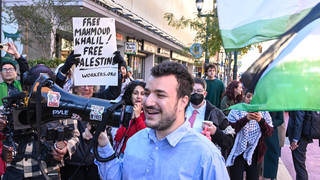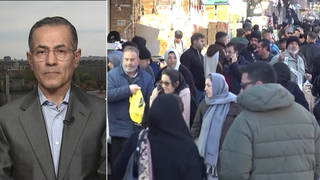
Topics
Guests
- Gilbert Achcaremeritus professor of development studies and international relations at SOAS University of London.
President Donald Trump has returned to Washington after a NATO summit where leaders agreed to increase their military spending to 5% of GDP by 2035, more than doubling the current target of 2%. The increase comes after years of pressure from Trump, who accuses other countries in the military alliance of not spending enough. “What he is interested in is catering to the military-industrial complex of the United States,” says Gilbert Achcar, emeritus professor of development studies and international relations at SOAS University of London. “When he asks these NATO countries to increase their military expenditure, he means 'buy more U.S. weapons.' That’s what he is doing. He’s a salesperson for the military-industrial complex.”
Transcript
AMY GOODMAN: I’m Amy Goodman, with Nermeen Shaikh. This is Democracy Now!.
NERMEEN SHAIKH: President Trump is back in Washington after the NATO summit, where leaders agreed to increase their military spending to 5% of their GDP by 2035. The NATO summit occurred just days after Trump ordered an attack on three Iranian nuclear sites. This is Trump speaking with NATO Secretary General Mark Rutte about the Israel-Iran ceasefire, which continues to hold.
PRESIDENT DONALD TRUMP: They’re not going to be fighting each other. They’ve had it. They’ve had a big fight, like two kids in a schoolyard. You know, they fight like hell. You can’t stop them. Let them fight for about two, three minutes. Then it’s easy to stop them.
MARK RUTTE: And then, daddy has to sometimes use strong language to get them to stop.
PRESIDENT DONALD TRUMP: You have to use strong language. Every once in a while, you have to use a certain word.
NERMEEN SHAIKH: That was President Trump and NATO Secretary General Mark Rutte, who referred to Trump as “daddy.”
Earlier today, Iran’s Supreme Leader Ayatollah Ali Khamenei issued a video statement where he claimed Iran had won the war, and vowed that Iran would never surrender.
AMY GOODMAN: This all comes as Israel’s mass killing in Gaza continues. Palestinian officials say Israeli forces killed another 90 Palestinians over the last 24 hours, including dozens waiting near new food distribution centers.
To talk more about NATO, Iran and Gaza, we go to London, where we’re joined by Gilbert Achcar, emeritus professor of development studies and international relations at SOAS University of London. He’s the author of several books, including The New Cold War: The United States, Russia, and China from Kosovo to Ukraine. His recent piece for the French paper Le Monde is headlined “History’s crossroads: Gaza or the failure of the West.” And he’s writing a new book, it’s just about to come out, Gaza Catastrophe: The Genocide in World-Historical Perspective.
Professor Achcar, it’s great to have you with us. Let’s start off by what came out of NATO. Trump has been pushing this since his first term, that the 32 member countries spend far more on weapons, which means cutting social programs, green programs. And you have the NATO secretary general sitting next to him, Mark Rutte, calling Trump “daddy.” Your response?
GILBERT ACHCAR: Yeah. Good morning, Amy. And good morning, Nermeen. Very nice talking to you.
Well, that was a pathetic spectacle, what we’ve seen, this NATO summit. That was the shortest of all NATO summits, probably. I mean, it was cut to the size that fits the attention span of Donald Trump, which is no longer than two hours, seemingly. I mean, if you just imagine that you have 32 countries represented there, and just divide the two hours by 32, you’ll see how long it gives everyone. And the result was, you know, very much meant to please Donald Trump.
This decision that you mentioned, to increase military expenditure to the level of 5% of GDP, which is a very high level, even if you take into account that that means practically 3.5% for strictly military expenditure and 1.5 on security and other kind of related expenditure, that’s still absolutely huge. And for many, many of those 32 countries of NATO, that would mean doubling — more than doubling, for some — their military expenditure. And that’s absolutely huge and can only happen, as it is happening in the United States, where you have record military budgets with Donald Trump and cutting in Medicaid, cutting in social expenditure of every kind. You know that better than I know. So, that’s exactly what is going to happen at the level of the whole of NATO and is happening.
And basically, this meeting was a convergence between two factors. One, the Trump factor, of course, but we have to be aware of the fact that Trump does not really give a damn about NATO itself. He doesn’t regard Russia as an enemy. He actually has more affinities with Vladimir Putin than with most of these European leaders. And the summit proved that. I mean, there were hardly a mention, just one, of Russia. What he is interested in is catering to the military-industrial complex of the United States. And when he asked these NATO countries to increase their military expenditure, he means by that, buy more U.S. weapons. That’s what he is doing. He’s a salesperson for the military-industrial complex, along with the Trump Organization and other businesses. With the Gulf countries, it’s exactly the same. He got them to promise hundreds of billions of dollars of expenditure on military, on military purchases.
So, you have a convergence between that, and now the military-industrial complex of those European countries that have a large military industry, and that is mostly countries like Germany, France, Britain — the United Kingdom, that is — and Poland. And these are the countries that are now pushing for more military expenditure. And you can see that most of the countries where they don’t have such industries are very reluctant to follow. So, there is this convergence of interest of military-industrial complexes wanting more money, more expenditure on means of destruction. at the very time when we are lacking every kind of things.
And, you know, just to give you an illustration of someone who got the lesson, because he is following in the footsteps of the poodle tradition of Tony Blair, and that’s Keir Starmer. I mean, he is happily increasing the military budget of the United Kingdom, and part of that is buying, just a very recent decision, 12 F-35 from the United States at a cost that has been estimated, overall, hardware plus what comes with it, at close to $2 billion. And that will — I mean, these are planes that will be able to carry nuclear loads, but that would be under U.S. control, I mean, the nuclear — the use of these nuclear weapons. So, that’s also an abandonment of — I mean, a further one — of sovereignty. So, you have this from a government in Britain at a time when you have the National Health Service completely understaffed. And there you have Keir Starmer explaining to the public opinion in this country, in Britain, that this purchase of 12 F-35s will create a huge lot of jobs. I mean, this is pitiful, absolutely pitiful.
NERMEEN SHAIKH: And, Gilbert Achcar, very quickly, you said that NATO — that Trump doesn’t care about NATO, but NATO seems to care an enormous amount for Trump. So, if you could just say a little bit about that? We just have 30 seconds.
GILBERT ACHCAR: Yes, I mean, it’s uneven in NATO, but, of course, the closer you get to the Russian borders, the more countries are afraid and need, or believe that they need, U.S. protection. And you have some of those states, the larger states, those who have a military-industrial complex, as I said — if you look at France and Germany in particular — trying to push forward the idea of an autonomous European defense. But it’s not very popular in NATO ranks. Even Britain, as I said, does not follow at all that kind of line. Now, this being said, we are seeing, we are witnessing the recurrence of a pattern that was very familiar during the Cold War, where the Pentagon and the military-industrial complex in the United States would inflate considerably the so-called risk, the threat, the communist threat, or whatever it is, the threat from the Soviet Union, in order to increase —
AMY GOODMAN: Gilbert, we just have 20 seconds.
GILBERT ACHCAR: — to increase their military expenditure. Yeah.
AMY GOODMAN: We’re going to go to Part 2, and we’re going to post it online at democracynow.org, so people should check out the website for a web exclusive with Gilbert Achcar, professor emeritus of development studies and international relations at SOAS University of London.
That does it for our show. We’re hiring for multiple positions. Go to democracynow.org/jobs.
I’m Amy Goodman, with Nermeen Shaikh, for another edition of Democracy Now!.












Media Options